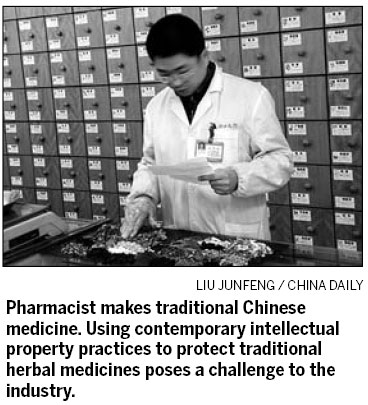

A traditional Chinese medicine (TCM) maker recently filed suit in the Beijing No 1 Intermediate People's Court against the State Intellectual Property Office's Patent Re-examination Board after its patent for a cardiovascular medication was revoked.
In 2004, Shanghai Xingling Pharmaceutical was granted a patent on a ginkgo compound used to treat cardiovascular disease and the production techniques used to produce it.
The company then secured eight invention patents for the medicine in the United States, Britain and Australia, now the company's major export destinations.
Miao Min, a Chinese citizen, applied to void the patent in 2008 and the board ruled last year that patent was invalid due to lack of inventiveness.
The company then sued, asking the court to find the board's ruling invalid.
The court is now considering the evidence and has yet to render a verdict.
The patent board cited previously released German research on the medicinal effects of gingko leaves as evidence to refute Xingling's claim for creation of the medicine, Xu Shenmin, Xingling's attorney told China Daily.
German pharmaceutical giant Schwabe began research on leaves from the gingko tree in the 1970s.
Though inspired by the German study, Xu said the Shanghai company developed a new formula, which includes two substances from gingko and is more effective than the remedies discovered by the German studies.
Another issue in the case is the board finding that Xingling did not create its own method of controlling phenolics, compounds that can cause an allergic reaction.
Though it is a common knowledge that phenolics are allergenic, techniques to maintain them at safe levels pose a big challenge because there are many kinds of phenolics, Xu said.
Different from traditional boiling and crushing the entire plant, which contains both medicinal elements and unwanted ingredients, Xingling uses "Western medicine technologies to make high-purity TCM", Xu said.
After extracting substances from ginkgo leaves, Xingling's patented process "can substantially increase the purity of effective medicinal elements and improve the effect", Xu said.
The attorney contends Xingling developed a new way of controlling the content of ginkgoic acid, a type of phenolic, to 0.1 parts per million.
In its revocation ruling, the patent board also cited a description of gingko ingredients in a technical brochure, "scores of lines covering half a page" as evidence that the formula is in the public domain.
Xu said that the grounds based on which the board made the invalidation decision were not presented by the petitioner Miao. That is against normal hearing principles and has left Xingling unable to mount a proper defense.
The gingko ingredient description does not specify what effect each portion has on health and is not "a technical means to resolve a specific technological problem" as required in guidelines for patent re-examination, Xu contended.
"Various parts of the intellectual property system - patents, trademarks, measures against unfair competition and trade secrets - should all be capitalized on for protection of traditional Chinese medicine," said Jiang Zhipei, law professor of People's University of China.
The current intellectual property system developed by Western countries may not fully protect traditional herbs, so policymakers should undertake research and formulate a suitable way to support the growth of traditional cultural heritage, Jiang suggested.
China Daily
(China Daily 04/07/2010 page17)